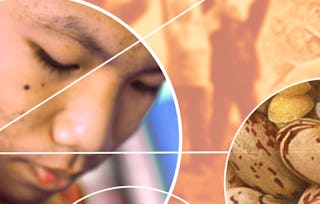This course addresses the global rise in cardiometabolic diseases (CMDs) like diabetes, hypertension, and high cholesterol, especially in low- and middle-income countries. CMDs require long-term, personalized care, placing a heavy burden on individuals, families, and healthcare systems. The course explores how healthcare personnel can support lifelong treatment in resource-limited settings and develop healthcare models for underserved populations.
即将结束: 只需 199 美元(原价 399 美元)即可通过 Coursera Plus 学习新技能。立即节省

您将获得的技能
- Community Health
- Primary Care
- Nutrition and Diet
- Health Care
- Education and Training
- Chronic Diseases
- Exercise Science
- Clinical Nutrition
- Health Equity
- Patient Education and Support
- Care Management
- Health Promotion
- Long Term Care
- Healthcare Industry Knowledge
- Public Health
- Socioeconomics
- Health Disparities
- Preventative Care
要了解的详细信息
5 项作业
了解顶级公司的员工如何掌握热门技能

该课程共有4个模块
In the first module, you will be introduced to the challenges of cardiometabolic diseases (CMDs) in India and other low- and middle-income countries. We will examine why the prevalence of these diseases is rising and the impact of this challenge on individuals, families, and healthcare systems. You will learn about the development of three central cardiometabolic conditions, diabetes, hypertension, and dyslipidemia (high cholesterol), how they are related, and the complications they can lead to. You will also experience how the Christian Medical College Vellore provides healthcare to remote and underserved populations with the use of mobile clinics and close collaboration between local community health workers, nurses and doctors from the regional health centres.
涵盖的内容
6个视频7篇阅读材料2个作业1个讨论话题
People in India and many other low- and middle-income countries have a higher risk of developing cardiometabolic disease – even at a younger age and lower bodyweight compared to people of for example European descent. In this module we will focus on the specific risk factors for cardiometabolic disease in South and Southeast Asia. We will also focus on how screening for cardiometabolic diseases is done at CMC Vellore and the challenges related to screening.
涵盖的内容
2个视频3篇阅读材料1个作业1个讨论话题
Leading a healthy lifestyle is key to preventing and treating cardiometabolic diseases – no matter if people have a genetic predisposition for these conditions or not. In this module we will look at the various aspects of healthy living and also the barriers many people experience in their attempt to follow health guidelines and treatment plans.
涵盖的内容
6个视频6篇阅读材料1个作业2个讨论话题
Cardiometabolic diseases are chronic conditions that require continuous care with a focus on educating patients about their disease as well as supporting them in following the treatment plan. In this module we will focus on how to initiate care for a newly diagnosed patient and how to tackle the challenges related to continuity of care. We will see how multidisciplinary healthcare teams with local community health workers, nurses and doctors collaborate when providing education, support and treatment for patients. Finally, we will also look into the importance of informal support to cardiometabolic patients through a case study from Vietnam.
涵盖的内容
3个视频6篇阅读材料1个作业1个讨论话题
从 Public Health 浏览更多内容
 状态:预览
状态:预览University of Copenhagen
 状态:预览
状态:预览The University of Sydney
 状态:预览
状态:预览University of Copenhagen
 状态:免费试用
状态:免费试用Imperial College London
人们为什么选择 Coursera 来帮助自己实现职业发展




常见问题
To access the course materials, assignments and to earn a Certificate, you will need to purchase the Certificate experience when you enroll in a course. You can try a Free Trial instead, or apply for Financial Aid. The course may offer 'Full Course, No Certificate' instead. This option lets you see all course materials, submit required assessments, and get a final grade. This also means that you will not be able to purchase a Certificate experience.
更多问题
提供助学金,












